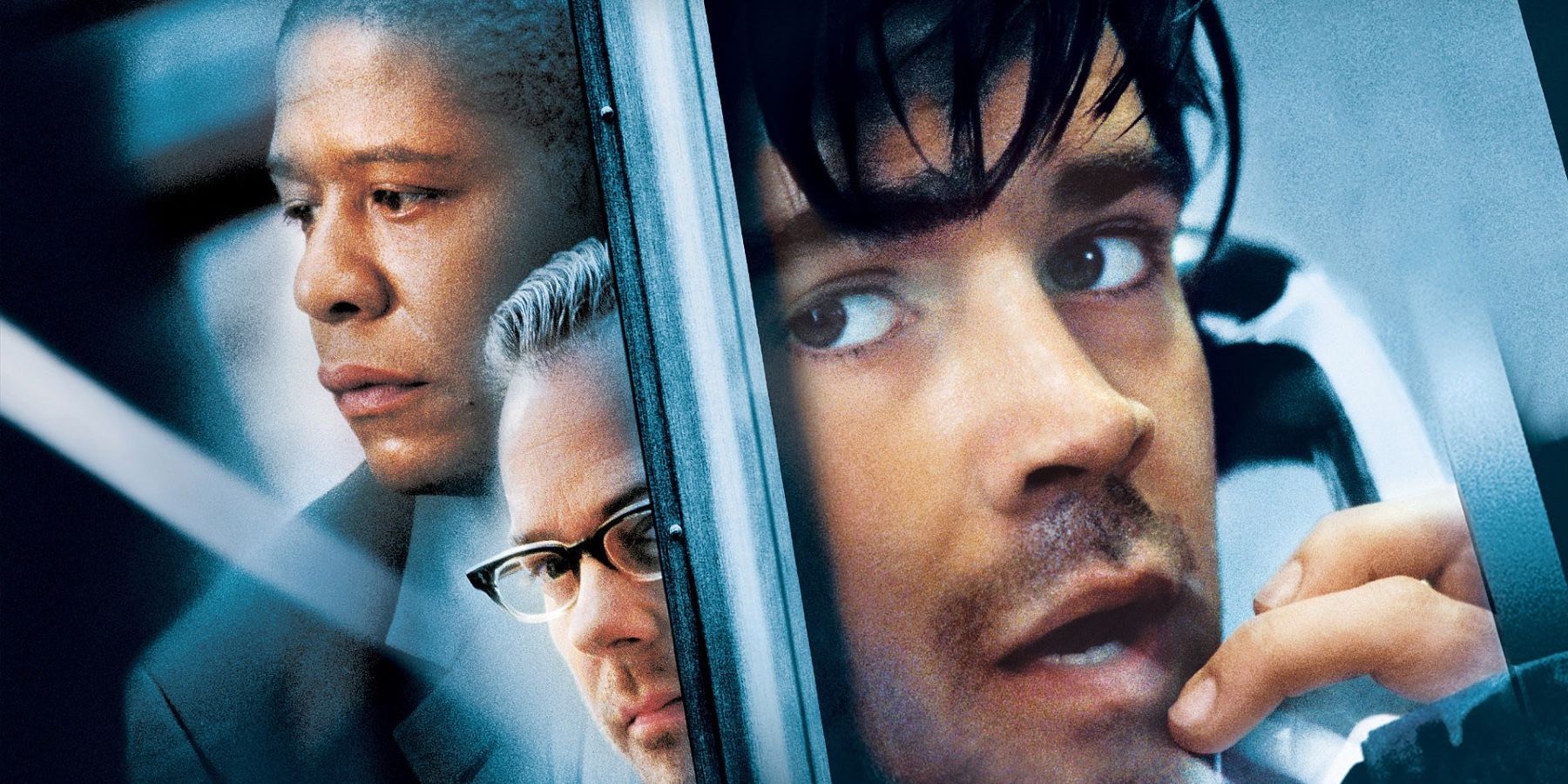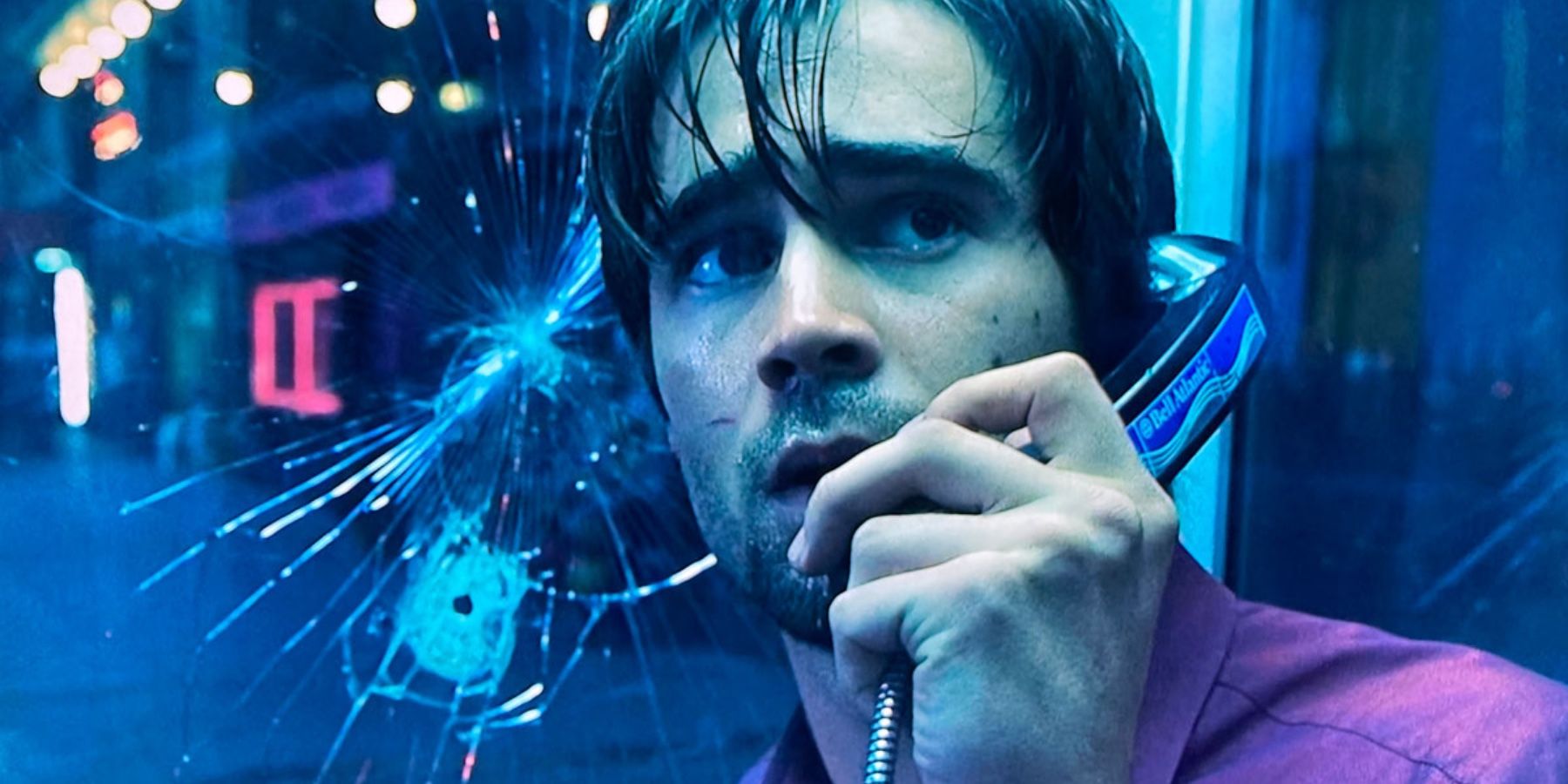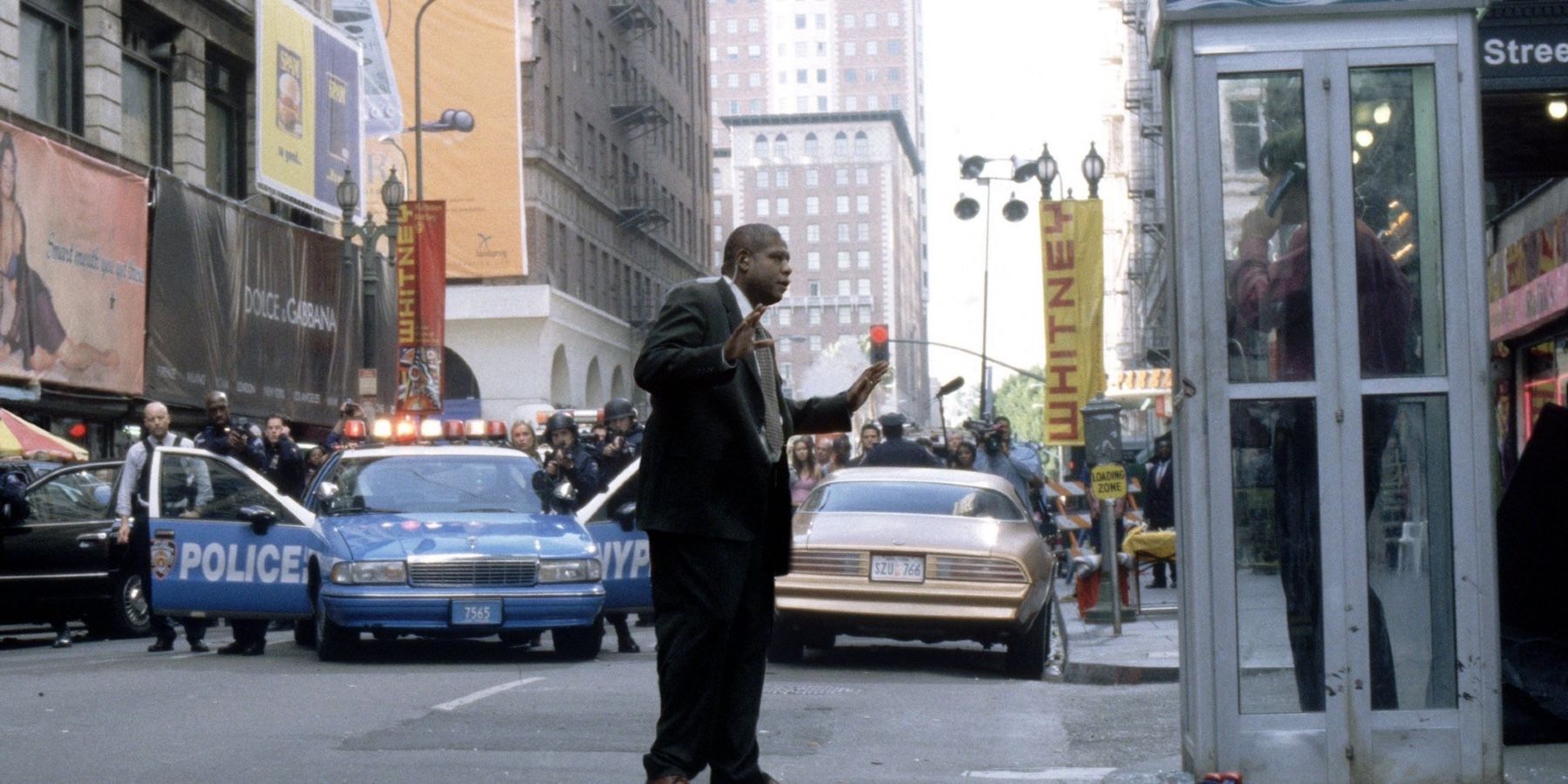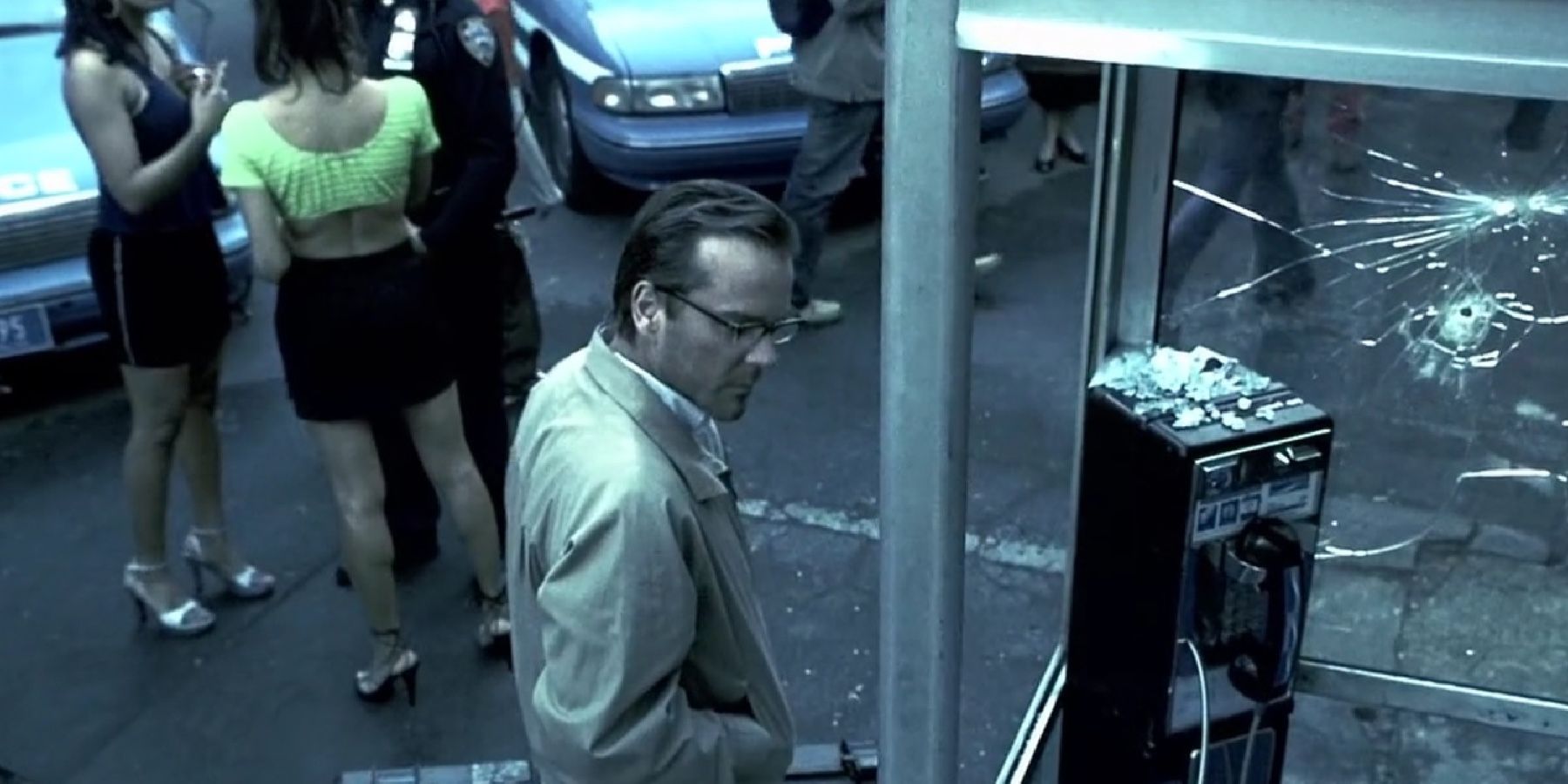Twenty years ago, Colin Farrell starred in Phone Booth, a psychological thriller directed by the late Joel Schumacher. This feature revolves around a self-centered publicist named Stuart "Stu" Shepherd, who's held captive in a New York City phone booth by a mysterious sniper. As Stu, Farrell delivers his best and most intense performance as a man who firmly believes he's in control of his career until his hostage crisis humbles him and changes the course of his life.
Farrell is also accompanied by a great supporting cast, including Forest Whitaker as a police captain who understands that Stu's situation isn't what it seems, and Kiefer Sutherland (who has previously worked with Schumacher in the horror film The Lost Boys and the courtroom drama A Time To Kill) provides menace and dark comedy as the anonymous caller who holds Stu at gunpoint. The thriller was not only well-received critically, but it was also a major box-office success, earning nearly $100 million worldwide with a budget of $13 million. Schumacher's film also resembles an Alfred Hitchcock whodunit thriller due to the elements of murder committed by a mysterious killer.
Colin Farrell Solidifies Himself As A Leading Man
Colin Farrell hit his peak in the early 2000s when he starred in action films such as Daredevil and S.W.A.T. He also worked with Schumacher before on the war film Tigerland, which put Farrell on notice as a major star. Phone Booth gave Farrell an opportunity to go even further as a lead actor by portraying a conflicted protagonist who initially isn't very likable, and occupies most of the film's screen time.
Stuart "Stu" Shepherd is one of those wealthy guys who does what he pleases, ordering people around, and being snobbish and profane to others (plenty of profanity and f-bombs equivalent to a Scorsese picture). He can be a nice guy and knows a lot of people, but when he receives a call in a phone booth from an unknown man, Stu slowly becomes more vulnerable. He panics, demanding to know what the caller wants from him. The majority of the film involves Stu having a series of tense and philosophical conversations with the captor, who forces Stu to admit to all of his flaws, such as wanting to sleep with another woman when he's already married or being rude to other people (including a delivery man offering pizza to him in a phone booth).
Farrell is at his best here as Stu because his character is a transformative one, from a selfish businessman and unfaithful husband to a humble human being who "bares his soul" to his captor and to the world on camera. His interactions with the caller are intense because they are sarcastic towards each other. At one point, Stu tells the caller that he wishes he had died in order to taunt him. Stu also pretends to persuade him in telling his life story (his service in the Vietnam War or a failed actor) in order to give him publicity and news coverage in exchange for his freedom, but the caller doesn't buy anything that Stu sells him.
There are a couple of times when Stu does outsmart his captor, for instance when Stu communicates with his wife Kelly (Radha Mitchell) and Captain Ed Ramey (Whitaker) by using facial expressions and choosing his words carefully to signal that everyone around the phone booth is in danger. Sutherland provides the perfect voice as the villainous caller because he is taunting, controlling, and funny all at once. He enjoys making Stu suffer in the booth, and takes pleasure in tricking Stu by making him think that he will eventually be set free when in reality the caller (seemingly) wants Stu to get shot dead by the police (many of whom initially believe Stu killed a pimp outside the booth due to witnesses on the scene).
The Film Works Like A Hitchcock Thriller
Schumacher's film is inspired by the work of Alfred Hitchcock in several aspects. For instance, the concept surrounding an innocent man (Stu) who is falsely accused of murder and has to figure out how to outwit his antagonist (the caller) with help from authoritative figures (Ramey and the police). Similar to the Manhattan apartment building in Rear Window and the Bates Motel in Psycho, this thriller mostly takes place in one setting (the phone booth in Times Square), causing a sense of claustrophobia and isolation for the protagonist Stu. The setting also gives viewers a sense of the busy urban atmosphere of New York with the streets, high buildings, cars, and the noise of the public (even though the film was actually shot in Los Angeles in ten days).
Also like Hitchcock, this thriller uses split screens and quick cuts to focus on the character's actions, such as Stu when he makes several phone calls to business contacts in the beginning, and when he secretly uses his cell phone to call 911 and Kelly to signal trouble. While everyone uses an iPhone now, this 2002 film reveals how the world transitioned from regular telephones in phone booths to cellular phones, but despite this transition, any type of phone can still be used as an effective source of communication in order to track and make specific phone calls. In Stu's case, he uses the phone booth to call Pam (Katie Holmes), a woman he likes, so that Kelly doesn't know that he's been talking to another woman, especially since she checks his cell phone records. The caller knows this and uses it to threaten Stu and the women in his life.
The use of split screens is also effective when Stu tries to figure out which apartment room window the caller is in. Sutherland's role as the caller is also well concealed because he doesn't reveal himself until the very end. This means that the film relies on Sutherland's powerful voice for the role and the plot to work, and every element succeeds due to the drama between Farrell and Sutherland's characters. There's also a religious aspect to the scenario because the phone booth can be viewed as a confessional in which the caller is a god or devil forcing Stu to confess his mortal sins.
The screenwriter of the feature, Larry Cohen, actually pitched the concept of Phone Booth to Alfred Hitchcock in the 1960s, but at the time they couldn't figure out how to form a strong plot that's confined to a telephone booth. Aside from the vulgar language, Hitchcock would be proud of this thriller due to the psychological tension between Farrell's lead character and Sutherland's enigmatic sniper, as well as the combination of modern technology and human drama.




